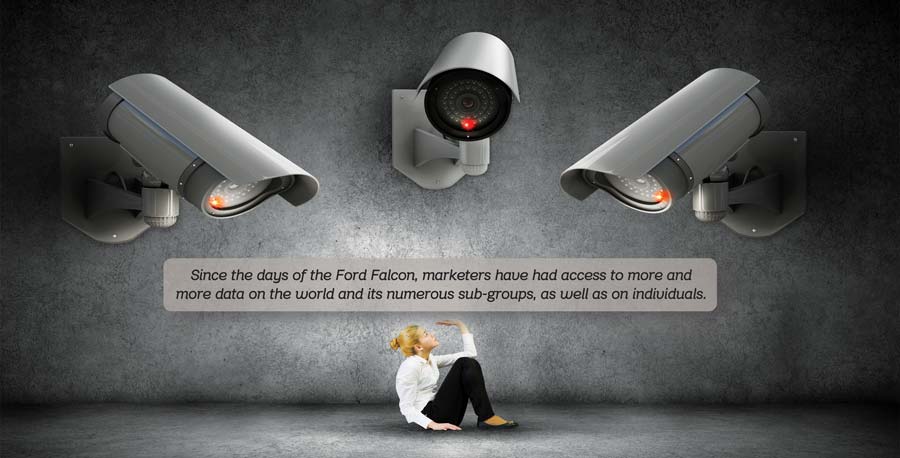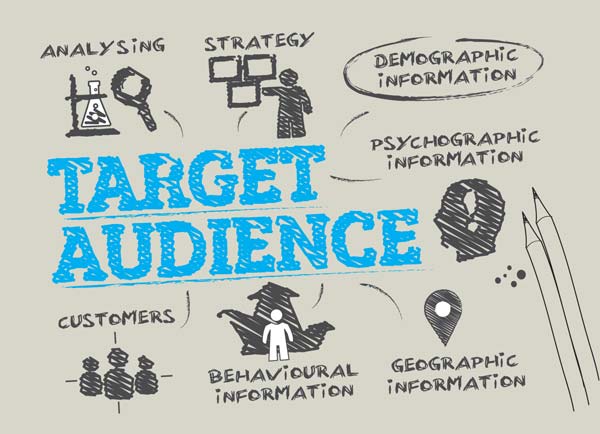



Big data and the death of privacy
Since the days of the Ford Falcon, marketers have had access to more and more data on the world and its numerous sub-groups, as well as on individuals.
George Orwell’s novel 1984, was dismissed by many as negative scare-mongering when it was published in 1949, with its negative image of a dystopian future where ‘Big Brother’ watches you. Nowadays we accept that ‘being watched’ is just another part of everyday life. And we’re not just talking about the CIA and FBI viewing private emails and tapping phones, or drones and CCTV cameras filming us from above.
There is also the world of social media and Internet search engines. Every ‘like’ and ‘dislike’ and ‘share’ that you click on a Facebook posting goes into a big Facebook server somewhere, gets deleted (or not) and gets protected from someone else using it (or not).

It’s the same story with Internet search engines such as Google, Bing and Yahoo, which are all tracking search engines. These keep a record of your searches. After that record is logged, the software determines what search results come up for you the next time. In other words, if you were to search ‘palm oil environment problems’ on Google, you would get different hits (often on the first page of results) from what I get, or from what an activist gets.
You can use non-tracking search engines too. A popular one is DuckDuckGo, which does not log what searches you make; other similar ones are Startpage, Ixquick and Blekko. But for now, Google has such massive market dominance that the phrase ‘I suggest you DuckDuckGo that one’ would cause confusion, whereas ‘I suggest you Google that one’ is well and truly part of the current Internet lingua franca.
Applying psychographics
Psychographics is a more recent way of segmenting a market. Instead of by age, income or profession, it segments a market in terms of personal traits, values, attitudes, interests and lifestyles.
One of the more common ways of ways of classifying psychographics is by the ‘OCEAN’ model.
‘OCEAN’ stands for:
Although OCEAN as a way of classifying of personalities is not new (the initial model was advanced by Ernest Tupes and Raymond Christal in 1961), it has only recently gained prominence because of the Internet, and massive and cheap data processing. That means it can be used to profile huge numbers of people in terms of a wide range of buying patterns.
It got in the news with companies like Cambridge Analyitcam, which used it as a tool as they consulted on Ted Cruz’s US Republican campaign and the UK’s pro-Brexit vote. Another psychographic company in the news is Acxiom.
These are neither small nor insignificant companies. According to its Wiki page, Acxiom had revenue of US$1.2 billion and 4,320 employees all dedicated to data-mining. In the run-up to the 2016 US Presidential campaign, Cambridge Analytica’s CEO Alexander Nix claimed to have 4,000-5,000 data items on the majority of the US population. Also, Cambridge Analytica’s funding comes from Robert Mercer – a billionaire backer of Donald Trump’s Presidential campaign.

So, how should oils and fats companies utilise such innovations in updating their branding strategy?
A ‘full service’ from a top psychographic consultancy may cost millions and would be above the marketing budget of most oils and fats organisations. But even a small investment could yield big results.
In the short term, it is valuable to stop thinking in terms of simple demographics (professions or physical locations) and more along the psychographic range. Even just one part of the OCEAN model can do all you need to do. For example, focusing on the ‘N’ in OCEAN would mean taking these steps:
1. Focus on the more neurotic folks in a group.
2. Find out what media they prefer (where to advertise or what channel to use).
3. Give them something to be fearful or anxious about.
4. Present them with a ‘cure’.
Back to your own work practice. Do you check that you and your co-workers are using their PCs, mobile phones, smart phones and tablets with the full awareness of how much they are being watched? The question ‘Is Big Brother watching me?’ has been replaced by ‘Of course people are watching me, lots of them, so how do I modify my behaviour?’.
The psychographic approach is helpful in that it helps us to get away from labelling target markets in terms of overly simple labels such as countries and professions, and more towards values and motivation. These, after all, are more likely to determine people’s choices.
Dr Ian Halsall
Author & Researcher